How often do you use email to market your WooCommerce products? If you’re like most small businesses or freelancers, probably not enough. If you already know that email marketing is really important and are not sure where to begin. We can help!
While email marketing may seem complex at first, it’s mostly just an extension of blogging. To prove it to you, we’ll walk you through the basics and recommend some useful tools and plugins.
We’ll also give you some tips and tricks for connecting with your audience, plus show you how to sell your WooCommerce products directly in an email. Let’s get started!
What Is Email Marketing?
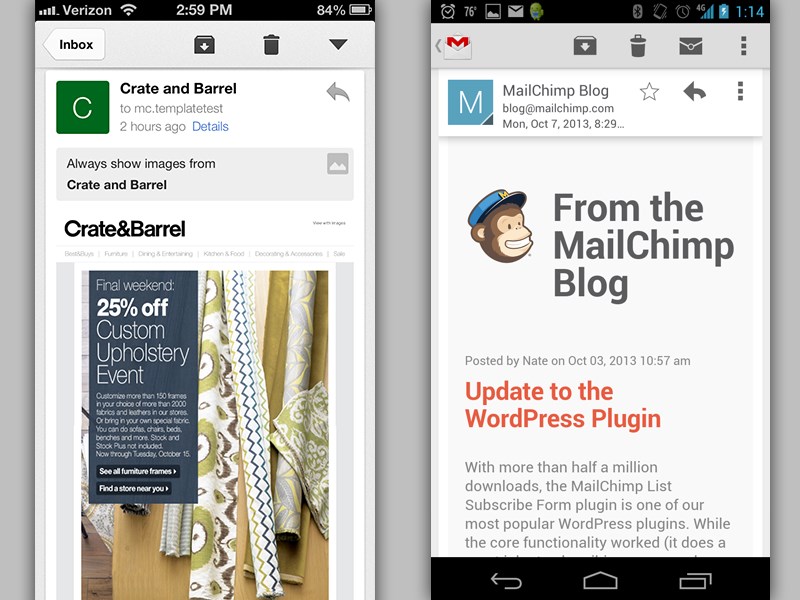
Put simply, email marketing is using email to market your products. As email is both highly personal and widely used, it’s a very effective channel for reaching your customers.
There are many forms of email marketing, but for the most part, they can be divided into two broad categories:
- Broadcasts are essentially just “regular” emails. They are sent manually and only go out once. Announcements and sales are common use cases for broadcast emails. The classic email newsletter is also a type of broadcast which is sent on a regular basis. Newsletters are great for sharing information, marketing your products, and building an audience.
- Automated Emails are emails that are sent in response to a particular event. Some popular examples include after signing up to a newsletter, after emailing a customer support desk, after purchasing a product, or after signing up for a course. You can schedule automated emails beforehand, hence the name automated. Automated emails are really powerful, as they allow you to send emails and content without having to manually create each individual item.
Elements to Consider Before Choosing WooCommerce Email Marketing Tools
Before you choose which WooCommerce email marketing tools to use, it’s helpful to determine what exactly you’re looking for. More specifically, what differentiates a good tool from a bad one?
In this section, we’ll briefly cover twelve metrics to be aware of when selecting a tool to use.
Price
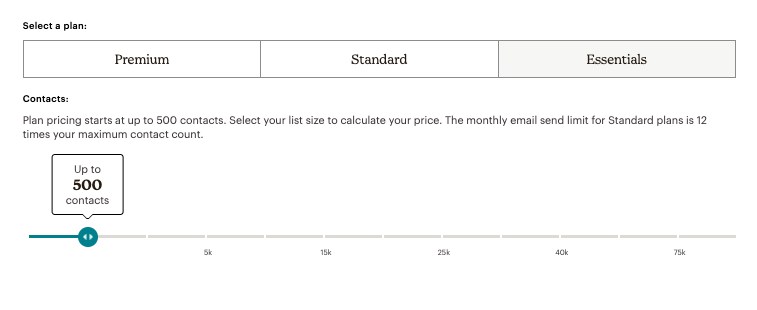
It can be confusing to determine the exact cost of using an email marketing tool. Depending on the particular tool, there are a number of variables that can affect the price.
They include:
- How many subscribers you have
- How often you send emails
- How many different versions of each email you can send (A/B testing)
- The type of email template you can use
Mailchimp, for example, ties your monthly email sending limits to your subscriber count. For the Essentials plan ($9.99/month), you can have 500 contacts (subscribers) and send 5,000 emails per month.
MailPoet, on the other hand, allows you to send unlimited emails, no matter what plan you’re using. Their pricing model is based purely on the number of subscribers you have.
So, when selecting a tool, first consider your particular situation. Do you send one email per month to a large list of subscribers? Or daily emails to a small list?
Certain tools are more suited for certain uses.
Typography
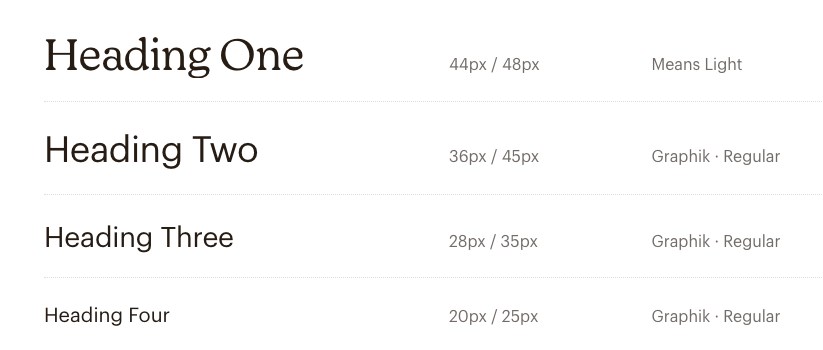
Typography is an often underrated aspect of marketing. Here at Astra, we believe in the power of good design and UX, which is why we’ve spent a great deal of time building numerous typography and design options in our theme.
The design and layout of your site can have a big impact on your bottom line. In fact, font selection has been shown in studies to increase sales by 1.5%.
The importance of typography is especially important when it comes to email, as many email clients block images by default for first senders. For many readers, the only thing they see is your text. As such, it’s critical to choose an email marketing tool that lets you send well-designed, well-spaced emails.
Ease of Use
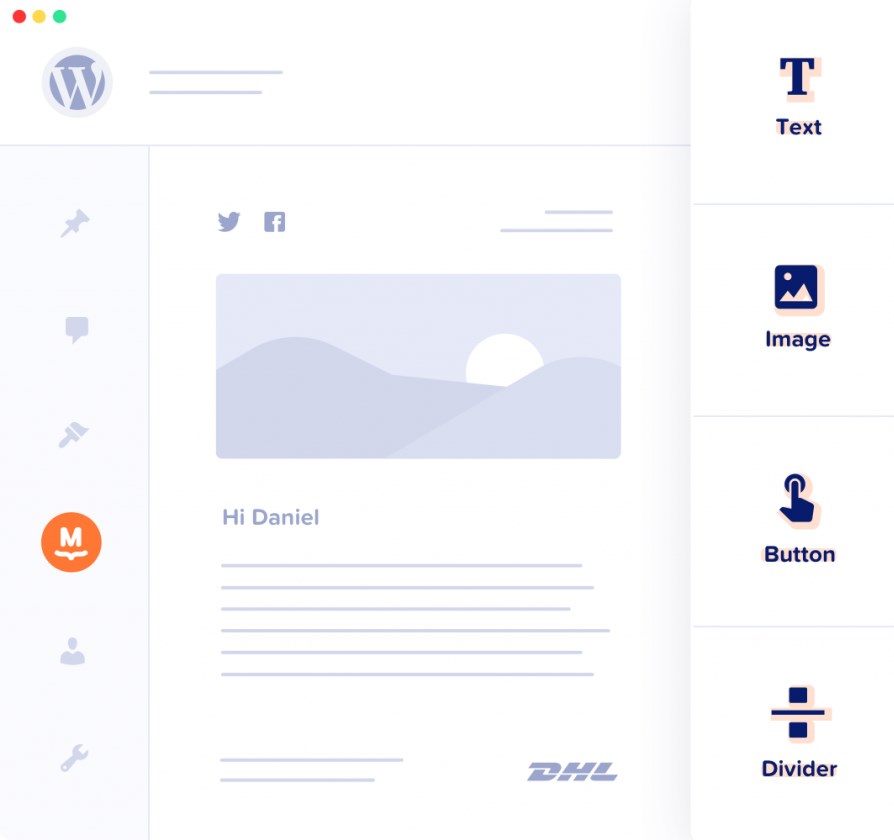
Since email is such an integral part of marketing, it is important to pick a tool that you’re comfortable using.
Email itself is a straightforward technology that most people are familiar with. However, some email marketing tools can be extremely complex and filled with customization options that you might not need.
Mailchimp, for example, has dozens of options and settings that you’ll likely never use.
If you’re comfortable with WordPress, MailPoet is a good choice as the entire email design process is right inside the WordPress dashboard. It is drag-and-drop and operates essentially the same way as any other page builder plugin.
Most of the tools we cover below have a free tier, so we recommend first trying one out to make sure you find it easy to use. If you don’t like one, try another!
Email Funnels and Automation
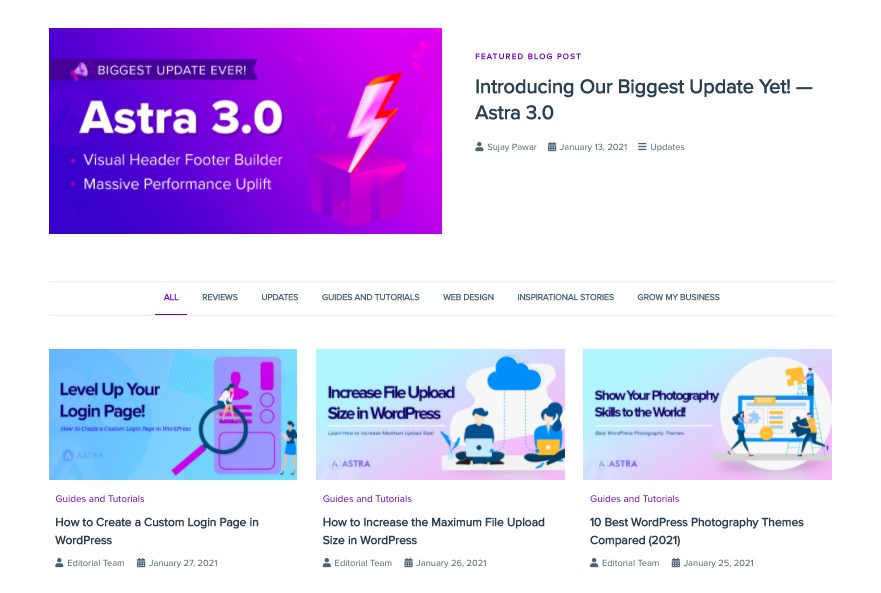
An email funnel is the process by which a prospective customer becomes an actual customer via email marketing. Usually, this means writing good content on your website, getting readers to sign up to a newsletter or email course, educating them via email, then selling them a product.
Astra is a good example. On our blog, we have a lot of awesome free content. If you join our newsletter (like over 300,000 other subscribers), you’ll get exclusive access to tips, articles, updates, and sales. Many of our email newsletter subscribers end up becoming our customers (if they weren’t already!)
Automation, short for automated emails, is how you create email funnels. The idea is to set up automatic emails ahead of time that are triggered after certain events.
The most comment events include:
- When a new user subscribes to your email newsletter
- When a customer purchases a product
- When a customer adds an item to their cart but doesn’t make a purchase (abandoned cart emails)
- After a certain period of time; e.g., after 10 days have passed since the user subscribed
Automation is an incredibly powerful email marketing tool. In fact, other than email newsletters, automated emails are probably the single most important aspect of email marketing. By creating a series of automated emails, you can set up an entire email funnel that will run almost entirely by itself.
Most email marketing tools will include automation tools. They are usually called Automations, Automatic Emails, or a specific variant like Welcome Emails or Post-Purchase Emails.
- MailChimp calls their automatic emails Automations
- MailPoet calls it Automation
- Constant Contact uses Automated Emails
Autoresponders
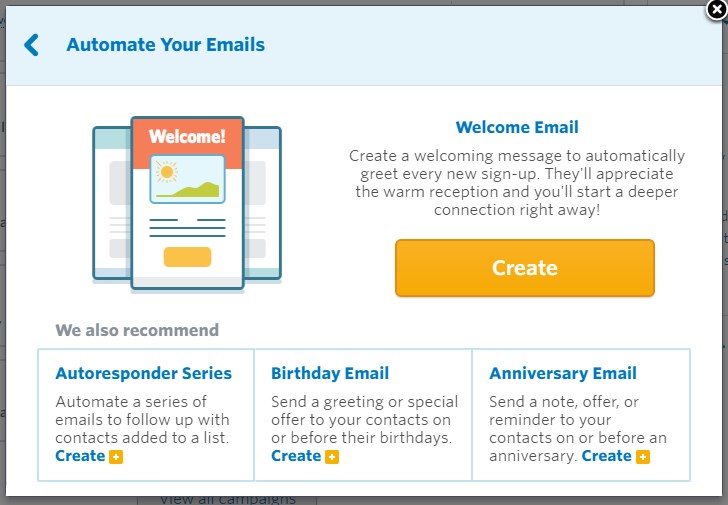
Autoresponders are a type of automation used by nearly every company today. Autoresponders are emailed replies that go out after a certain action, like subscribing to a newsletter, purchasing a product, or emailing the customer support team.
They are scheduled ahead of time and can also be used for check-ins, or upsells that go out weeks or even months after the initial email was sent.
For example, if a customer emails your support desk, they (should) receive an automated response thanking them for their message, along with details about the query and when they can expect to receive a direct response.
Once you answer their query or solve their problem, they should also receive an email a few days later that asks them to rate the quality of support they received.
These days, most customers have come to expect this kind of automated communication so going without it is not recommended. If the first email a customer receives is hours or days after they send it, they’ll probably have a bad impression of your company.
Thankfully, virtually every eCommerce solution has some autoresponder mail options.
Reporting and Site Tracking
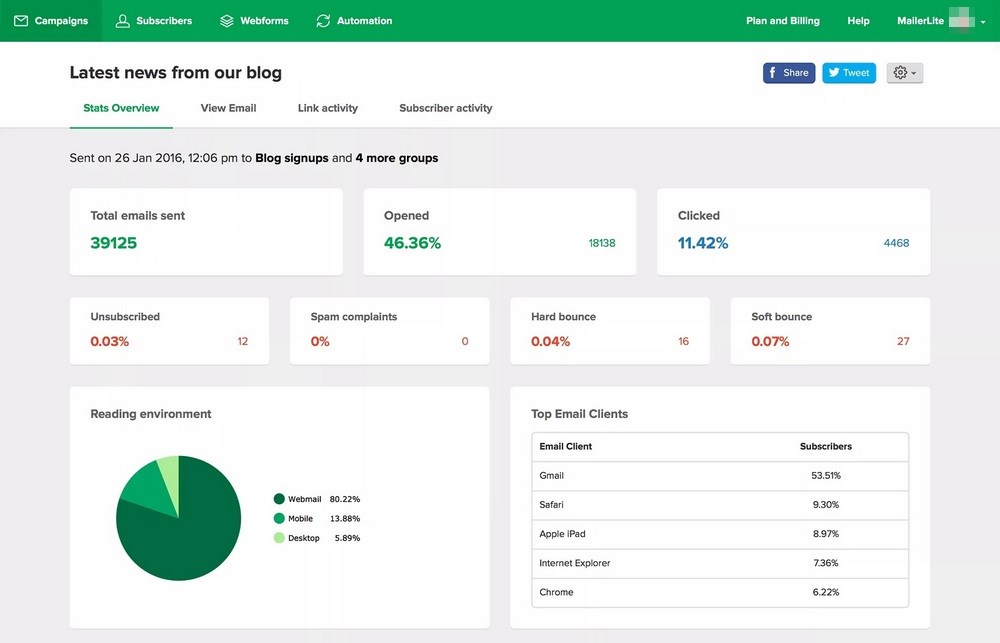
“What gets measured, gets managed.” By keeping track of the results of your emails, you can adjust and improve them to increase revenue, opens, or whatever other metric you desire.
All email marketing tools have some form of reporting, although many charge more money for more detailed reports.
Mailchimp has extensive reporting features, including open and click rates, social media post results, landing page and conversion tracking, and Google ad spending results. MailPoet has a simple, easy to use analytics system that tracks everything about emails, as well as subscribers’ WooCommerce purchase data. Other services have similar features.
Newsletters
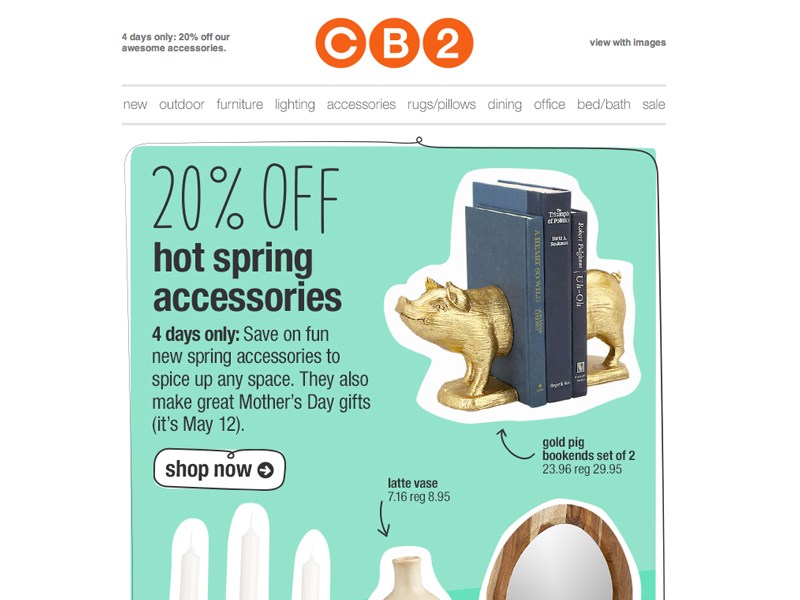
Newsletters are one of the most commonly used forms of email marketing. Virtually every company, blogger, or content creator has one – and for good reason!
Newsletters are an easy way to communicate with your readers, pitch them products, get their feedback, and generally stick to a content publishing schedule. A weekly newsletter is a great way to “force” yourself to publish enough content every week. You can also include products and sales directly in the email itself.
Here at Astra, we have a newsletter with over 300,000 subscribers. Sign up to get great content, tips, and deals in your inbox!
Email Designers and Templates
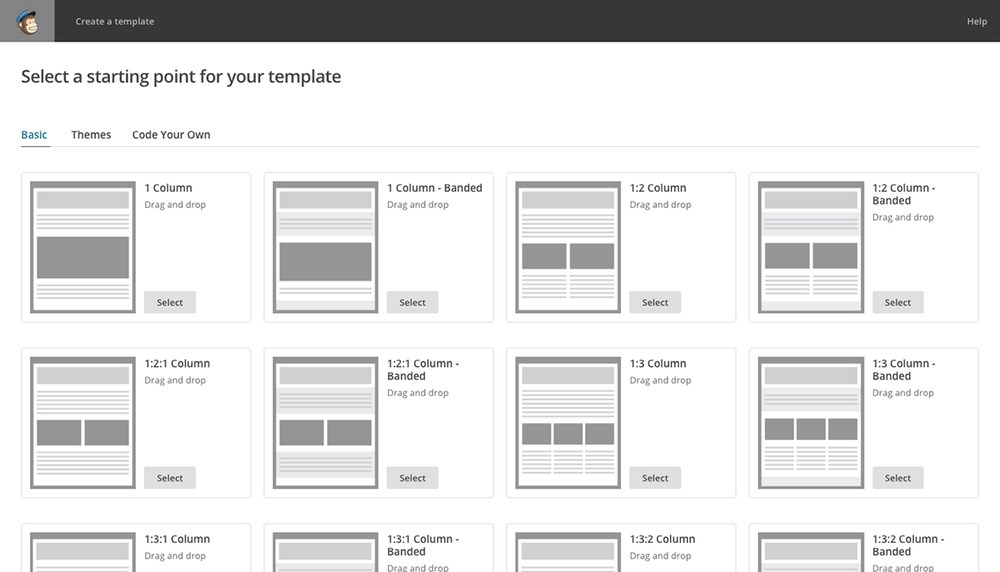
No one likes ugly emails! If you want your readers to like your newsletter and potentially buy a product, it’s critical to have well-designed, easy to read emails.
Different email marketing tools have different email designers. Some have more options than others. MailPoet, for example, uses a drag-and-drop tool to design your emails right in WordPress. Mailchimp has a visually appealing design editor that functions in a similar way, but isn’t directly on your WordPress website.
In general, unless you are confident in your design skills, you should try to use templates provided by the service rather than designing your own from scratch. Most services offer dozens, if not hundreds, of templates that are tailored for specific needs. You can modify them to fit your exact requirements.
Emails for Receipts and Email Delivery Tracking
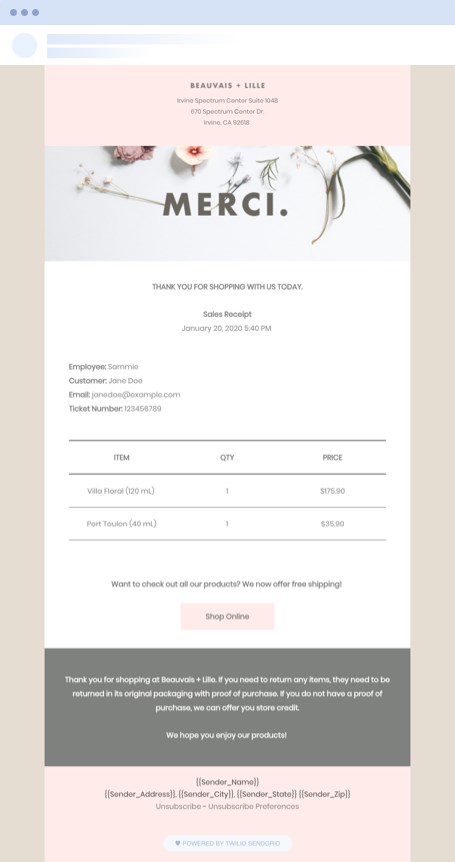
If you sell products online, sending a post-purchase sales receipt is a must. Everyone expects to receive an email shortly after making a purchase and if they don’t, something certainly went wrong.
You can also do this for products purchased in person. In the image above, the flower company sends a post-purchase email to the customer, thanking them for their purchase and sharing a link to buy more products.
Sending email receipts is also good for the environment, as it cuts down on paper waste!
Likewise, if you are selling physical products, informing your customers of the expected delivery date via email is an industry standard. Leaving the customer in the dark is not a good experience.
Segmentation and Cross-Selling
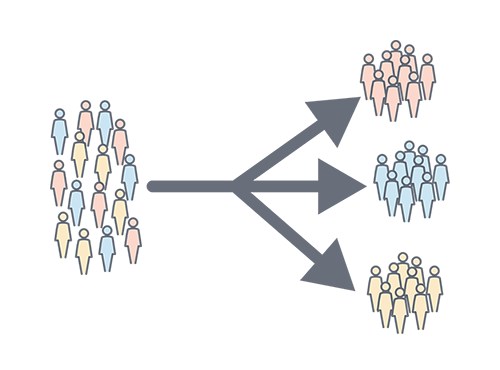
Segmentation is the process of dividing your email subscriber list into smaller pieces, or segments, depending on their particular characteristics. This is very useful, as only subsets of your subscriber list are interested in certain products.
Customers living near the equator, for example, probably don’t want to buy your parkas and other winter apparel. However, they will definitely be interested in beachwear. Using segmentation, you can filter customers by geographic location, timezone, gender, and more.
Virtually every email marketing tool has options for segmenting. Constant Contact, as an example, allows you to segment your list by list membership, contact details, custom fields, tags, and eCommerce activity. This makes it easy to only send emails to customers that have made previous purchases or those that signed up to your weekly newsletter.
Integration with Other Products and Services

Just as no man is an island, no email marketing plugin can function entirely on its own. Integrating with other plugins and services is especially important if you’re using WordPress and WooCommerce, which relies on a library of plugins to accomplish most tasks.
Read more: Check out the list of eCommerce platforms available for you to create an online store.
Order Follow Ups and Customer Feedback Emails
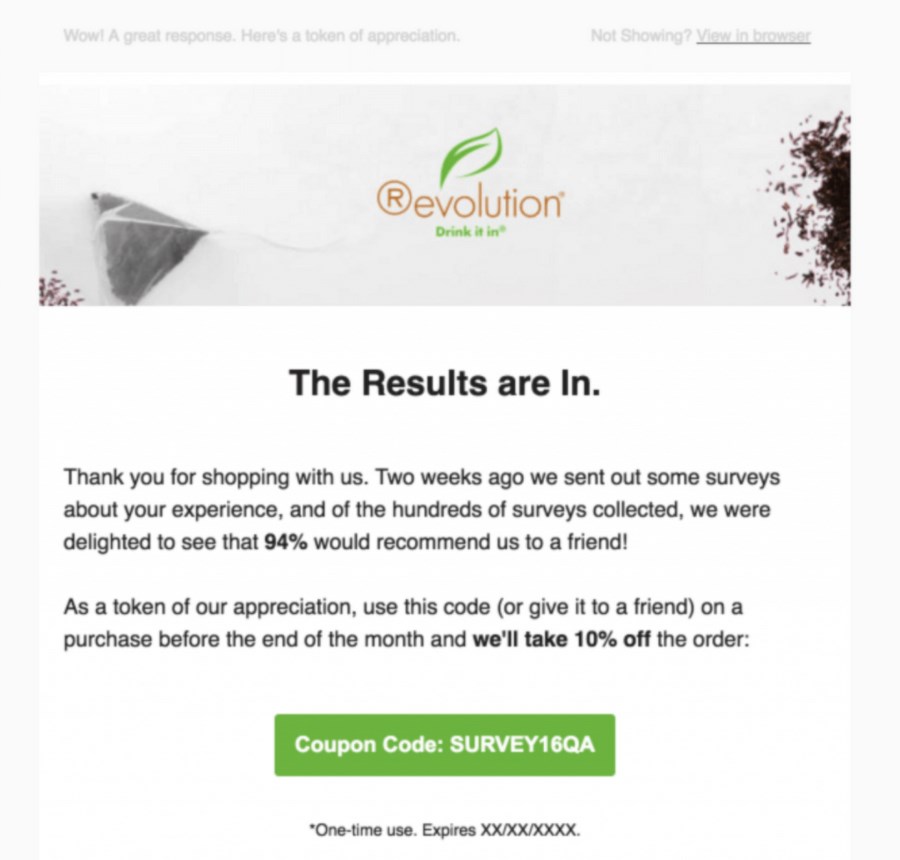
The actual sale of a product is only the beginning. The best customers are ones that come back to buy more. One easy way to encourage this is to send follow-up emails a few days after the product is delivered.
This helps increase customer satisfaction and loyalty and also nips problems in the bud before they become serious issues down the line.
You can use email to ask your customers if they’re satisfied or if you can improve anything about the process.
Giving your customers an opportunity to communicate with you is a great way to build rapport, gain loyalty from your audience, and turn current customers into future customers. For these reasons, you should never use a [email protected] email address.
Whether you’re sending a newsletter, an email course, or even a delivery notification email, it’s important to always reply to any customer feedback or questions. Why? If you’ve emailed a company before and never received a response, you know how frustrating it is!
A good experience for a user often leads them to becoming a customer, while a bad experience almost guarantees that they’ll never buy anything from your company.
Top WooCommerce Email Marketing Tools (Best Plugins for 2023)
Now let’s take a look at nine of the best email marketing tools to use with WooCommerce.
- Omnisend – Best email marketing tool for WooCommerce
- Sendinblue – Most popular email marketing platform for eCommerce stores
- Mailchimp – Free to use WooCommerce email marketing
- Jilt – Offers the most basic email marketing features for beginner eCommerce store owners
- MailPoet – Email marketing plugin for WooCommerce
- MailerLite – WordPress email marketing plugin for eCommerce websites
- Constant Contact – Digital and email marketing software for WooCommerce
- Privy – Collection of tools than an email marketing platform
- Remarkety – eCommerce email marketing automation tool
- Klaviyo – Marketing platform designed for eCommerce businesses
1. Omnisend
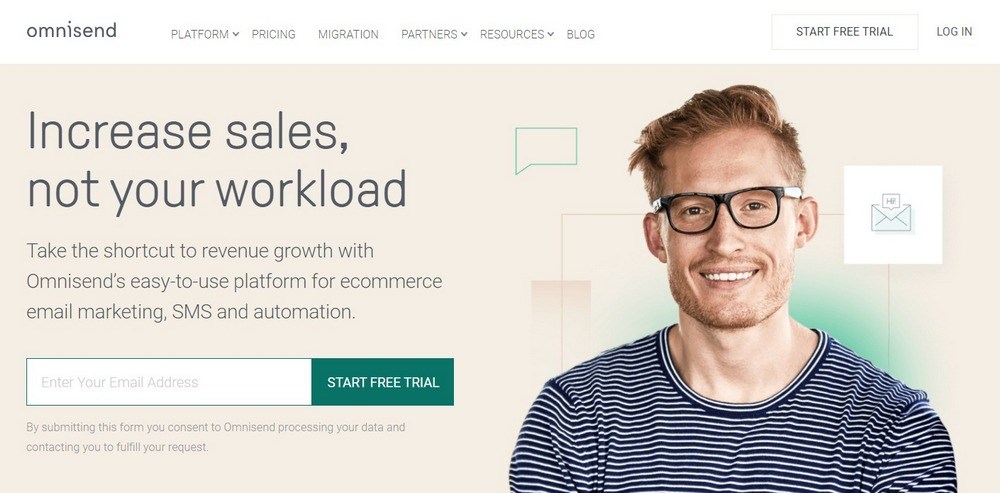
Omnisend is a platform for eCommerce email marketing and SMS (text message) automation. It integrates directly with WooCommerce with the Omnisend WooCommerce plugin.
There are a variety of form types, landing pages, and other ways to capture your readers’ emails. Once you have their emails, you can create personalized email campaigns to send to your customers. These can be easily combined with other channels in the same marketing campaign, like SMS or push notifications.
There are also robust segmentation options that allow you to target different kinds of customers and send customized emails based on your own rules. These can dramatically increase your email open rates and ultimately your sales.
Omnisend also has extensive automation options to effortlessly create actions that trigger automatically. After you do the initial work to set it up, it requires very little of your time to keep running.
Key Features
- Email Campaigns
- Use dozens of customizable email templates and share them across multiple stores
- Easily create shoppable emails with direct links to products
- Target segments within campaigns
- Campaign reports, click maps
- Email, SMS, and push notification campaigns
- Popups and Forms
- Pop ups, landing pages, and signup boxes
- “Wheel of Fortune” forms
- Customizable exit popups
- Phone number-only forms to build SMS subscribers
- Ready-made themes
- Automation
- Automatically combine multiple channels (SMS, email, push notifications)
- Pre-built workflows like welcome emails, cart abandonment, shipping confirmation
- Automation splits / if-then actions
- A/B split testing
- Built-in message reports to view results without leaving the automation editor
- Reports. Use reports to keep track of your sales and ROI, see how engaged readers are, see which emails perform well, and analyze particular sales.
- Keep track of sales and ROI
- Detailed revenue and engagement reports
- Bird’s eye view with all KPIs in one place
- Single customer view
- Cookie less tracking, cross-channel tracking, growth trends, and other reports
- Integrations. Integrate with other software programs like Shopify or WooCommerce to accomplish even more goals.
- Integrations with dozens of third-party software programs
- WooCommerce via the Omnisend WooCommerce plugin
- Segmentation
- Improve deliverability
- Rule-based segmentation options
- Dynamic customer targeting
- Facebook custom audiences and Google Customer Match
- Channels
- Combine SMS, email, and other channels
- Text message marketing with SMS, MMS, and more
Pricing
Omnisend has four subscription plans. The cost of each plan also changes depending on how many subscribers you have and if you pay monthly or annually. To get an exact price quote, use the calculator at Omnisend.com/pricing.
The prices below are for 500 subscribers and paying monthly:
- Free ($0)
- Up to 15,000 emails/month
- Email campaigns
- Sign-up forms, boxes, and pop-ups
- Reports
- Standard ($16/month)
- All features from Free
- Up to 15,000 emails/month
- SMS Campaigns and automation
- Email automation
- Audience segmentation
- 24/7 Chat and email support
- Pro ($99/month)
- All features from Standard
- Up to 15,000 emails/month
- Web push notifications
- Facebook Customer Match
- Advanced reporting
- Customer Success Manager (from 15K contacts)
- Custom Pricing
- Unlimited emails
- Email account migration
- Customer Success Manager
- Deliverability support
- Custom IP address
Takeaway
Omnisend is a great choice for WooCommerce entrepreneurs that want a single, all-encompassing plugin to cover everything. However, it is slightly more expensive than some other options.
2. Sendinblue
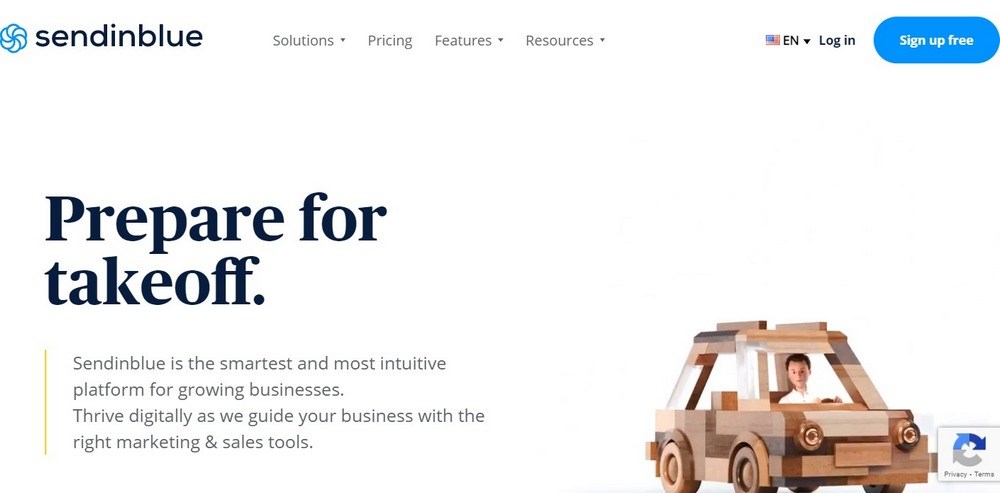
Sendinblue began as an email outreach tool but has gradually expanded to include CRM and wider marketing features. It is now a comprehensive marketing tool that can work for businesses of all shapes and sizes.
It has email tools with a smart drag and drop feature, live chat function, SMS marketing tools, a built-in CRM to help manage customers, marketing automation tools to help audience segmentation and other more advanced marketing campaigns.
Sendinblue also adds the ability to create landing pages for your emails, signup forms for list building, retargeting ads, Facebook ads and lots of testing tools.
It’s a comprehensive email marketing and management tool with just about every feature a small business could need.
Key features
- Drag and drop email builder
- A/B testing tools
- Email heat map tool
- Landing page builder
- CRM suite with lots of advanced features
- SMS marketing and chat tools
Pricing
Sendinblue has four price plans, Free, Lite, Premium and Enterprise. Each offers a few more features and more included emails than the preceding plan.
- Free ($0)
- Up to 300 emails per day
- Unlimited email contacts
- Lite ($20 per month)
- Up to 100,000 emails per day
- Email support
- A/B testing
- Advanced statistics
- Premium ($50 per month)
- Up to 1,000,000 emails per day
- Marketing automation tools
- Retargeting tools
- Facebook ads
- Landing pages
- Multiple accounts
- Telephone support
- Enterprise (Quotation only)
- Unlimited emails
- Priority email transmission
- Landing pages
- Multiple users
- SSO (SAML)
- Customer success manager
- Priority support
- Full access to Sendinblue tools
Takeaway
Sendinblue is much more than an email marketing tool. It has evolved into a CRM, SMS, chat, outreach, analytics and overall small business marketing suite. It’s ideal for any smaller business who wants more than email marketing.
3. Mailchimp
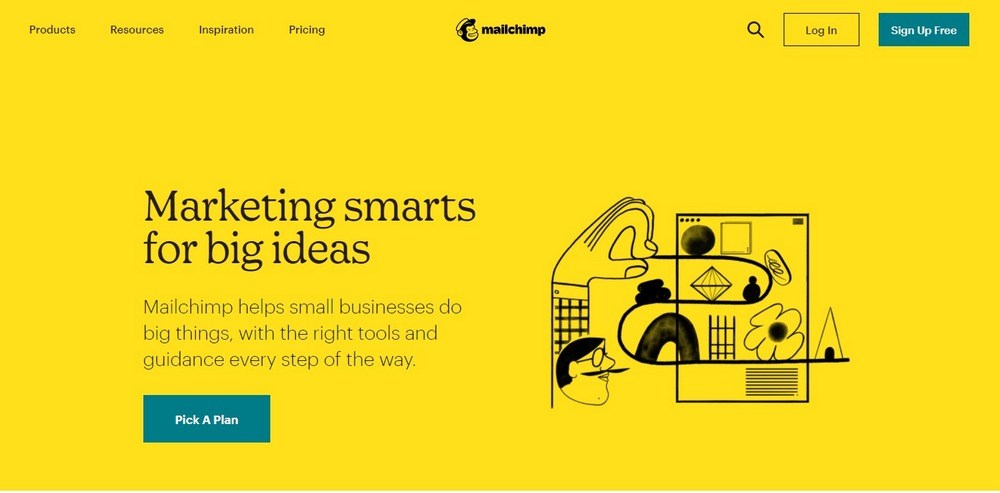
Mailchimp is one of the most popular email marketing software packages available. It has hundreds of features that can solve virtually any email marketing problem.
There are hundreds of email templates available, which are useful if you aren’t good at design. The email editor itself is also very customizable.
Mailchimp also has numerous ways to segment and test your emails, including A/B testing and customer journeys that send different emails depending on certain outcomes.
The audience and reporting features are top-notch, too. You can review Google ad click results, Facebook and social media posts, in-email clicks and opens, and access dozens of other statistics.
Key Features
- Hundreds of email templates
- Powerful email editor
- Customer journeys that control different outcomes and automation
- Transactional emails
- A/B Testing
- Reports and analytics
- 250+ app integrations
- Integrated channels: email, landing pages, digital ads, social posts and postcards
- Audience data: Marketing CRM, dashboard, segmentation, personalization, and predicted demographics
- Integration with WooCommerce via a WordPress plugin
Pricing
Mailchimp has four plans, each of which has a base price. This base price is added to by the number of subscribers. The number of emails you’re allowed to send per month is based on the number of subscribers you have.
It can be a little confusing to calculate individually, so use the calculator in the middle of this page to figure out your final price.
Mailchimp also offers a “pay as you go” plan. Instead of paying a monthly fee, you can pre-purchase email credits and use them when you want. This is ideal if you only send emails every few weeks or on an ad-hoc schedule.
For the paid plans, the prices listed below are for 500 subscribers (contacts in Mailchimp’s terminology.)
- Free ($0)
- Up to 2,000 contacts
- 1 audience
- Marketing CRM
- Creative Assistant
- Mailchimp domain
- Forms and landing pages
- Essentials ($9.99/month)
- Everything in Free
- Up to 50,000 contacts
- 3 audiences
- All email templates
- Multi-step journeys
- Custom branding
- A/B Testing
- 24/7 email and chat support
- Standard ($14.99/month)
- Everything in Essentials
- Up to 100,000 contacts
- 5 audiences included
- Customer Journey Builder + branching points
- Send time optimization
- Behavioral targeting
- Custom templates
- Dynamic content
- Premium ($299/month)
- Everything in Standard
- Advanced segmentation
- Multivariate testing
- Comparative reporting
- Unlimited Seats and role-based access
- Phone support
Takeaway
Mailchimp is the “default option” of email marketing. It has an extensive library of features, is affordable for most businesses, and can easily be easily upgraded when necessary.
4. Moosend
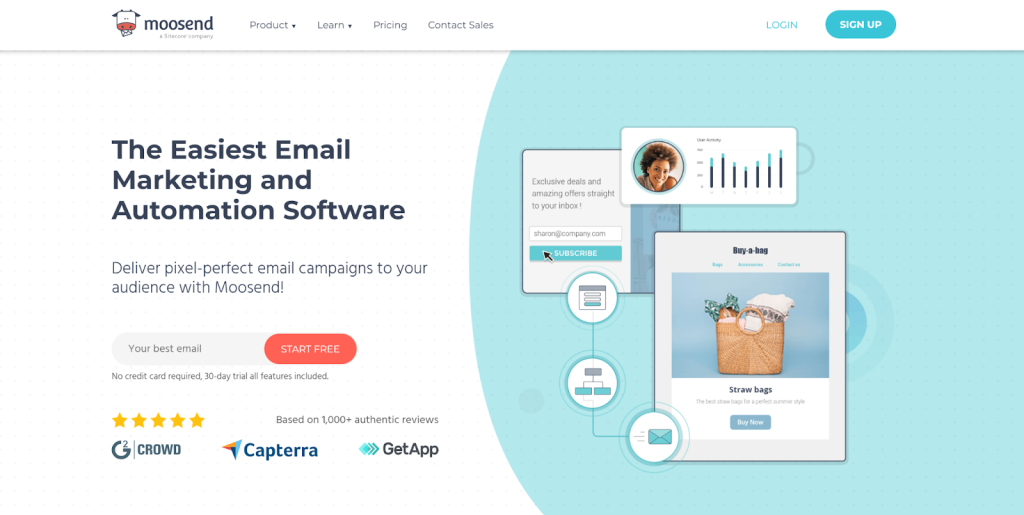
Moosend is among the best email marketing tools for small and medium businesses due to its advanced features and affordable pricing. The tool can be used easily by complete beginners, and its direct integration with WooCommerce is a definite plus.
Moosend equips provides a sophisticated drag and drop email builder, a variety of designer-made email newsletter templates, different styles of signup forms as well as landing pages.
Moreover, you get powerful automation tools to put your marketing campaigns on autopilot, segment your email list and deliver personalized content to subscribers.
The platform features a rich analytics dashboard where you can see everything regarding the performance of your campaigns visually. This helps optimize your future campaigns.
Overall, Moosend is an ideal choice for eCommerce businesses wanting a straightforward solution to grow their audience and increase sales.
Finally, the analytics options are powerful and include a number of metrics like revenue, lifetime customer value, average order value, and more.
Key Features
- Email Marketing
- Sophisticated drag and drop email builder
- Responsive and customizable email newsletter templates for every industry
- Countdown timers for your campaigns to leverage FOMO
- A/B testing tools
- Responsive campaigns across all devices
- Popups, Forms and Landing Pages
- Various subscription form styles to match your website
- Ready templates for forms and landing pages
- Fully customizable style that matches your brand
- Automation
- Visual workflow editor
- Automated flows such as welcome emails, cart abandonment, reminders and product recommendations
- Conditional logic
- Segmentation
- Audience segmentation based on different criteria
- Personalized emails with custom fields
Pricing
Moosend offers a 30-day free trial, a Pro Plan and an Enterprise plan. Alternatively, you can purchase credits (pay-as-you-go plan) based on your needs.
Free Trial
- Unlimited emails
- Automation workflows
- 1x Landing page / 1x Form
Pro ($9/month)
- Unlimited emails
- Automation workflows
- Landing pages / forms
- SMTP server
Enterprise(Custom quote)
- All Pro features
- Account manager
- Priority support
- SSO & SAML
- Dedicated IP
Takeaway
Moosend is a great choice for WooCommerce businesses that want a powerful yet cost-effective service that provides an all-in-one solution to their email marketing and automation needs. Its affordable pricing will be your best partner to grow your business.
5. MailPoet
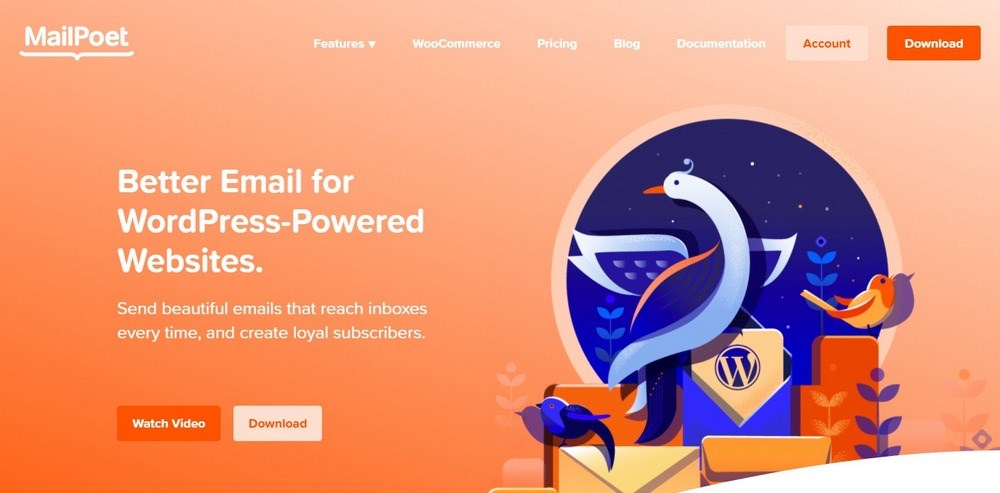
MailPoet is a long-time email marketing plugin for WordPress. It’s full of useful features and is endlessly customizable. Since it is a WordPress plugin, the entire email marketing process can be done directly on your website.
MailPoet was recently acquired by WooCommerce, which means that the integration opportunities between the two are now quite extensive. You can encourage your customers to sign up to your newsletter during the checkout process and customers can also automatically be added to a pre-built MailPoet list.
The automation features are also quite useful. You can send welcome emails, post-purchase emails, and target emails based on the product’s category.
If you want to manage your email marketing directly within WordPress, MailPoet is a great choice.
Key Features
- Extensive WooCommerce integrations, including checkout newsletter subscription
- Easily email your customers
- Automation using welcome emails
- Tailored emails for specific products and product categories
- Abandoned cart emails
- Customize your WooCommerce emails with MailPoet’s email designer
- Transactional emails
- Reports to measure revenue per email and other stats
Pricing
MailPoet has a simple pricing structure. You can send unlimited emails with any plan, and the price is determined by the number of subscribers.
The free plan allows up to 1,000 subscribers. Premium, which is required for 1,000 or more subscribers, also includes extra analytics and faster support.
Some pricing plateaus are listed below. Costs are based on paying monthly, not yearly.
- Up to 1,000 Subscribers: $0
- Up to 2,000 Subscribers: $25/month
- Up to 5,000 Subscribers: $55/month
- Up to 10,000 Subscribers: $75/month
Takeaway
MailPoet is an excellent option for those that want to manage everything from within their WordPress dashboard. Since their sending plans also allow you to send unlimited emails, they’re also a good choice for sending many emails to a smaller number of subscribers.
6. MailerLite
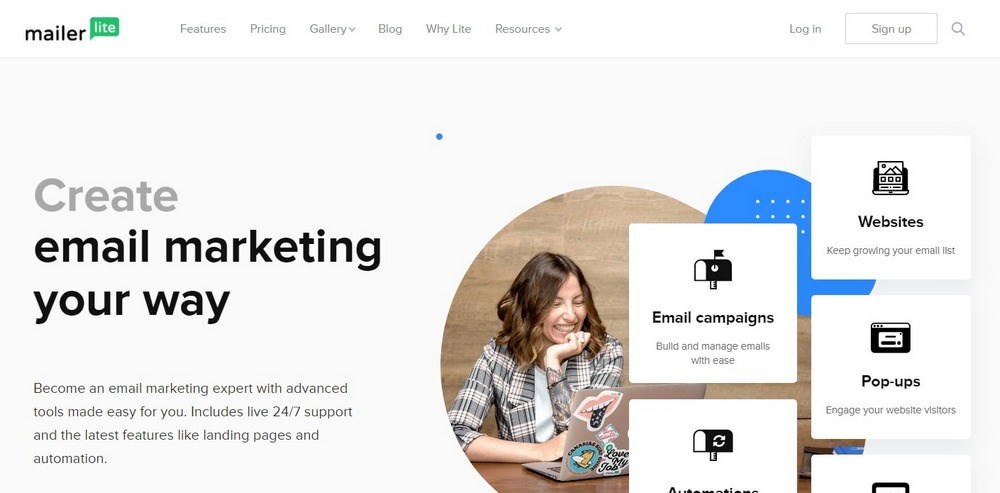
MailerLite is another option available to WordPress users. It has most of the features you’ll probably need, at a price that’s less expensive than some competitors.
You can create a variety of campaigns using the drag-and-drop editor or use one of the pre-made templates. The testing features allow you to conduct A/B tests, change sending time based on time zones, and segment according to other factors. There are over a hundred integrations available, too.
Key Features
- Create campaigns with a drag-and-drop editor, templates, and a custom HTML editor
- Landing pages, pop-ups, embedded forms, and subscriber management
- Automation
- Personalization
- Segmentation
- A/B Split testing
- Time-zone delivery options
- Auto-resend
- Integration with WooCommerce
- Tracking and reporting: surveys, click maps, opens by location, and specific campaign results
- Over 100 integrations
Pricing
Like MailPoet mentioned above, MailerLite has a simplified pricing structure. There are only two options: free and paid.
The Free Plan includes up to 1,000 subscribers, 12,000 emails per month, and most other basic features. The Premium Plan includes unlimited emails and additional features:
- Live chat support 24/7
- Remove the MailerLite logo
- Custom HTML editor
- Newsletter templates
- Custom domains
- Click maps
- Open by location
- Up to 1,000 subscribers – Free Plan: $0
- Up to 1,000 subscribers – Premium plan: $10/month
- Up to 2,500 subscribers: $15/month
- Up to 5,000 subscribers: $30/month
Takeaway
Mailer Lite has a lot of features for a low price. It’s a good choice if you only need some basic features and are on a budget.
7. Constant Contact
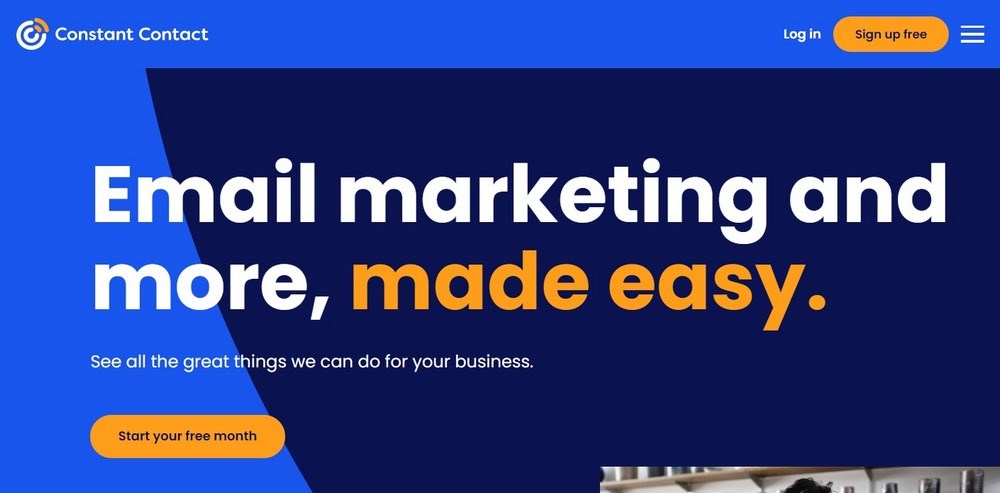
Constant Contact is a service aimed at small businesses that are new to email marketing. It has many of the standard features found in other options, with a few extras like RSVP and surveys. The design of the service is also very simplified and easier to use than some competitors.
You can create automatic welcome emails, triggered emails series, and even resend emails to non-openers. However, the automation features require choosing a more expensive plan, so if you’re on a budget and rely on automatic emails to run your business, it may not be a good choice for you.
Key Features
- Automation
- Welcome emails
- Triggered emails series
- Resend emails to non-openers
- Segmentation
- Segment your subscribers
- Social Marketing
- See how your social campaigns are performing
- Create Facebook and Instagram ads
- Contact List Management
- Upload contact lists from Salesforce, Excel, or Outlook
- Track results in real time
- Integration with WooCommerce
Pricing
Constant Contact has two pricing options: Email and Email Plus. Email lacks some important features, like automated emails, customizable pop-up forms, welcome emails, and coupons. Both plans are also based on the number of contacts you have.
- Email
- Starts at $20/month for 500 subscribers
- Includes unlimited emails, customizable templates, tracking and reporting, A/B testing in subject lines, and support
- Email Plus
- Starts at $45/month for 500 subscribers
- Includes advanced eCommerce marketing, automated emails, customizable pop-up forms, welcome emails, RSVP, Surveys, and all features in the Email plan
8. Privy
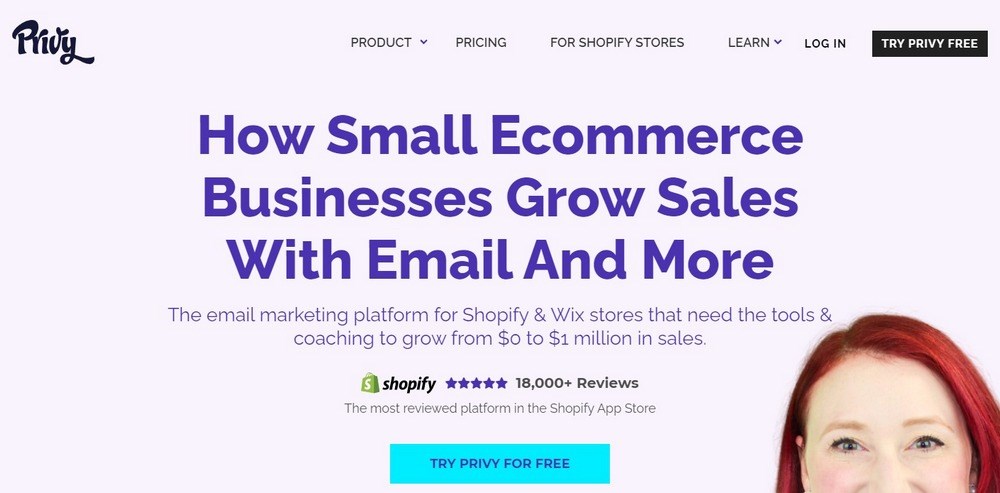
Privy is a marketing software package aimed at eCommerce users. It is a little different than the other plugins here, as it’s more of a collection of tools than an email marketing platform.
Key Features
Privy has three products, each of which can be used for different purposes:
- Privy Convert is for your website. You can display popups, cross sell campaigns, do advanced targeting, and similar things to gain subscribers.
- Privy Email is for emails. It includes email newsletters, coupon reminder emails, automated cart abandonment emails, and related features. You can send newsletters to build an audience, coupons to increase sales, and cart abandonment emails to recapture lost purchases.
- Privy Text is for text messages. You can text your subscribers cart abandonment texts, cart integrations, and after sign-up texts. Since most people have a phone, this is a powerful feature.
Pricing
You can purchase any of the three plans individually, or use their Starter Plan. The Starter Plan is only for users with less than 50,000 pageviews a month and includes both the Convert and Email features.
The pricing is rather complex and depends on a number of factors. As such, we recommend just trying their pricing calculator.
The Starter Plan is $30/month for unlimited emails and up to 2,000 subscribers.
9. Remarkety
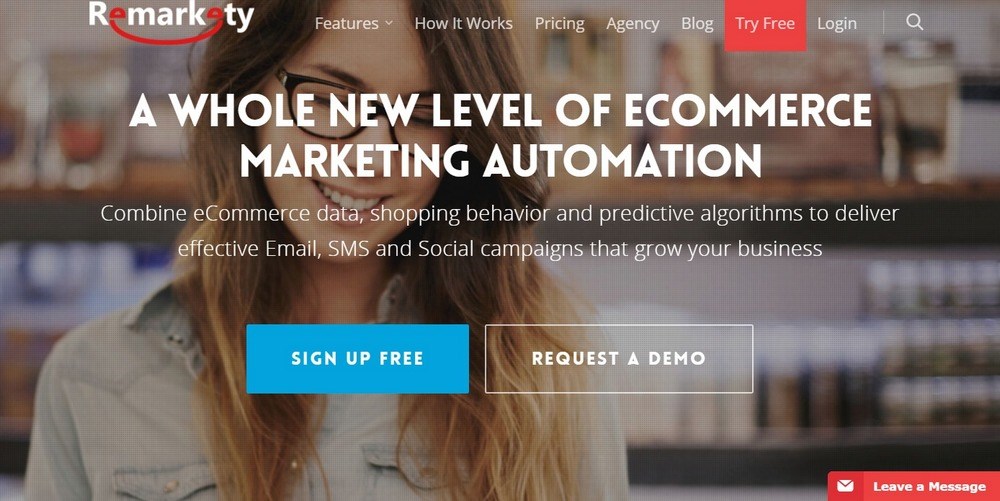
Remarkety is an email marketing service focused on eCommerce businesses, especially those with larger budgets. It has extensive features and is a great choice for those looking to craft highly-customized email marketing campaigns.
The testing features are unique and you can conduct A/B/C testing on multiple variables, including subject lines, email bodies, product images, and more.
You can segment your customers and create customized coupons, send automated follow-up emails to say thank you or ask for feedback, and send abandoned cart emails.
Key Features
- Customer segmentation
- Segment your newsletter readers
- Personalized coupons
- Automated follow-up emails
- Send thank you, post-purchase, shipping confirmation, and other types of automatic emails
- A/B/C testing
- Test subject lines, email bodies, product images, and other variables
- Abandoned cart recovery
- Automatically send emails to recover lost sales
- Predictive product recommendations
- Use AI and machine learning to optimize personalized recommendations
- Email performance tracking
- Track clicks, sends, opens
- Email and SMS messaging
- Contact your customers via email and text message
- Support for WooCommerce and other integrations
Pricing
Remarkety has four plans, each with a variety of different features and costs. Use the calculator on their site to determine your exact cost.
The prices listed below are for 500 subscribers. All plans include a 14-day trial.
- Basic ($25/month)
- eCommerce integration
- Unlimited email sends
- Segmentation
- Performance reports
- Over a dozen other features
- Starter ($100/month)
- All Basic features
- Custom branding
- Advanced ($300/month)
- All Starter features
- Custom email templates
- Dedicated account manager
- POS integration
- Personal onboarding session
- Custom API
- Phone support
- Professional ($800/month)
- All Advanced features
- Multiple sending domains
Takeaway
If you’re a business that wants to run highly-customized email marketing campaigns, give Remarkety a look. While it is expensive, the tools it offers are worth it.
10. Klaviyo
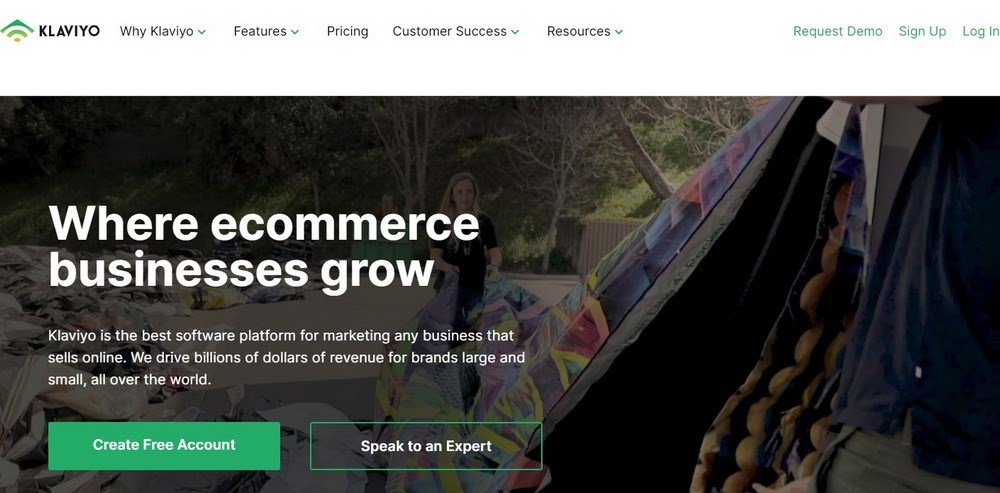
Klaviyo is an all-encompassing marketing platform designed for eCommerce businesses. It has a number of interesting features and uses data science to optimize your marketing campaigns and maximize revenue.
The segmentation options include dynamic segments that are updated in real-time, which allows you to target them even more narrowly. Other variables include average order value and acquisition source, which helps you determine which customers are profitable and where they’re coming from.
The highlight of Klaviyo, however, is its data science and reporting capabilities. You can predict a customer’s next purchase date and total future spending, probability of repurchasing, and lifetime value calculations. As you can imagine, these are all very useful for increasing your sales by focusing on the most lucrative segments.
Finally, the “benchmark” feature is unique and compares your performance against others in the same industry. So, for example, if you’re in the “furniture store” industry, you can see how your open rates compare to other furniture retailers using Klaviyo. It’s a powerful tool that helps keep you on track and focused.
Key Features
- Forms and personalization
- Flyouts, pop-ups, and embedded forms
- Profile, segment, URL and location targeting
- Delay the pop-up until time on page, scroll percentage, and page exit
- Segmentation
- Dynamic segments update in real-time
- Highly-customized behavioral segmentation
- Combine and exclude segments
- Event-based segmentation, like purchases or subscription
- Segment by numerous other factors, including average order value, acquisition source, frequency, and more
- Data science
- Predict a customer’s next purchase date
- Estimate total future spending
- Probability of churn
- Customer lifetime value calculations
- Predicted gender
- Pick the right time to send emails
- Reporting
- Flow, campaign, and signup form reports
- Automatic report-creator
- All reports on a single screen
- Analytics dashboard
- List growth report
- Benchmarks
- Compare your results to others in your industry
- Highlight opportunities to generate revenue
- Automation
- A/B testing
- Split and branch emails in a series
- SMS
- Send messages with SMS
- Integrates with WooCommerce and other platforms
Pricing
Klaviyo’s pricing model is simple: you pay either by the number of subscribers or the number of SMS text messages sent. Try out their calculator here to determine the total cost.
- 500 Contacts: unlimited emails for $20/month
- 500 SMS messages sent: $5/month
Takeaway
Klaviyo is a powerful email marketing tool with some unique features. It’s also quite affordable, especially compared to other options on this list.
Conclusion
Email is a critical aspect of any business’s marketing strategy. No matter which tools you use, the important thing is to use something. Even if your business relies on other forms of marketing like social media, email is still absolutely necessary.
If you’re new to email marketing, we recommend trying out MailPoet or Mailchimp. Both are friendly to new users and have powerful free plans. If you’re a seasoned marketing professional, try Klaviyo. Its rich feature set will give you a deep insight into your customers and email marketing campaigns.
What email marketing software have you used with WooCommerce? What has been your experience? And did we miss anything? Let us know in the comments!

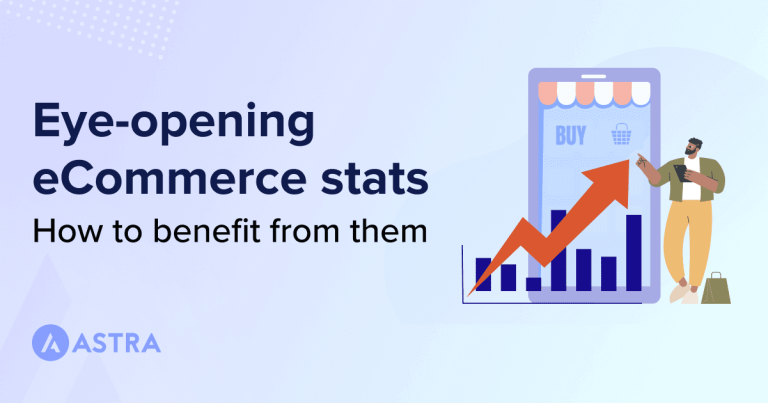

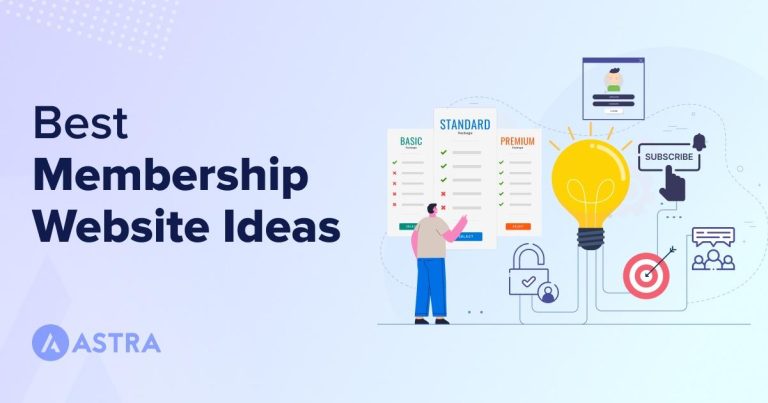
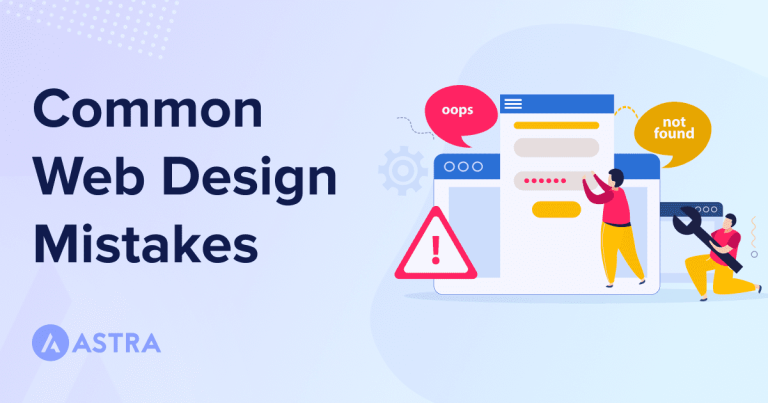
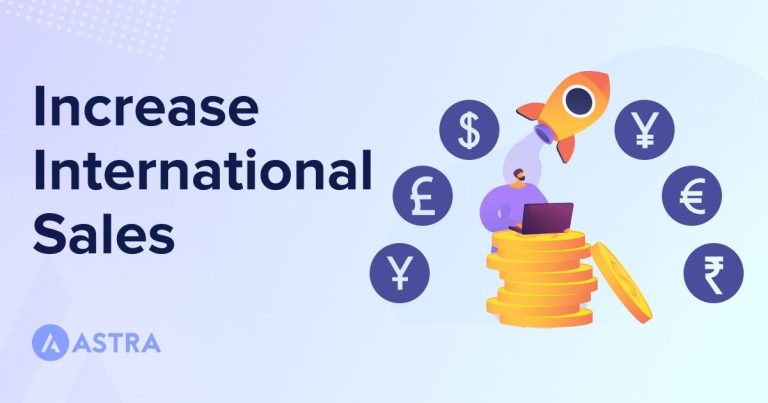
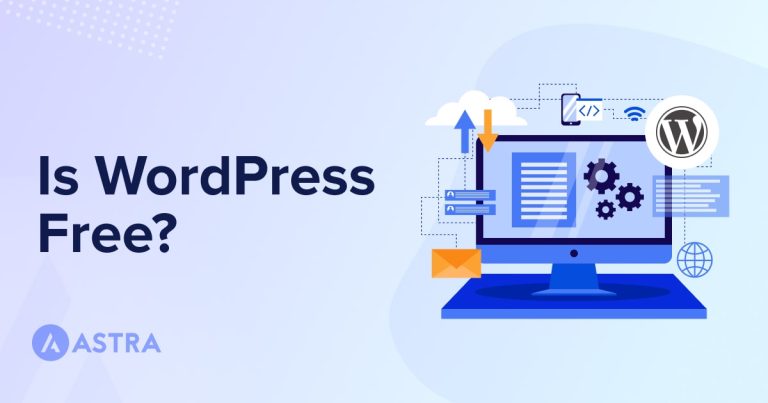
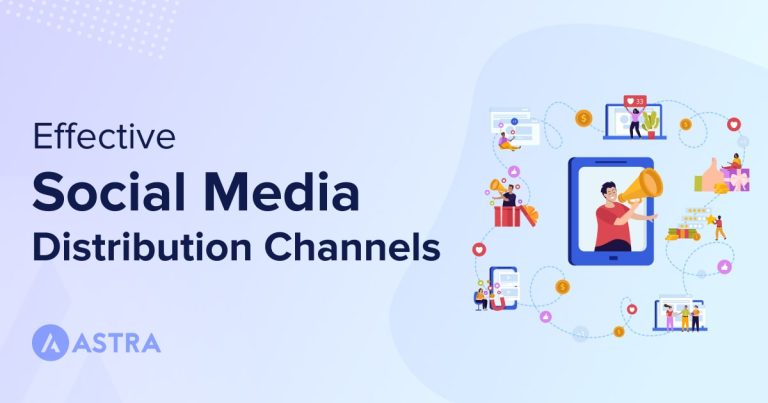

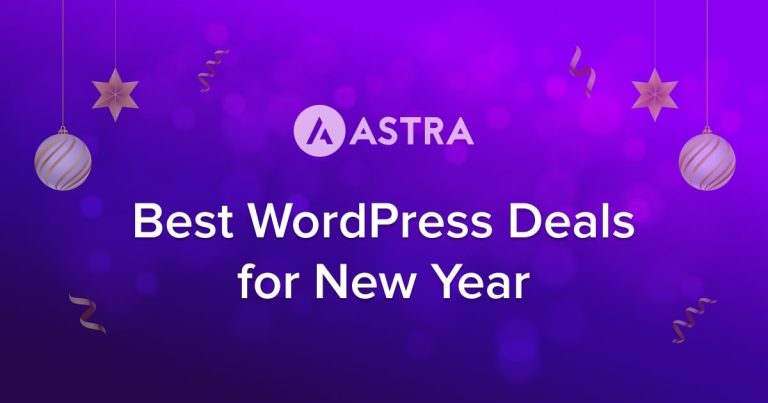
5 comments
That’s a good list! But I think you missed Mail Engine. I am using it for a pretty long time and won’t deny the positive results it gave me. MailEngine helps me to write 100% unique & spam-free content. Also, it helps me to send 100% unique URLs every time I create a new email. I hope you will find it useful and add it to your blog.
Hello Robin, glad to see your suggestion and feedback! Much appreciated.
I am trying to set up my mailing with Mautic which is a free open source solution
However I cant seem to find any good pop up plugin which works well with Mautic integration
I tried Master Popups with my site ( which has Astra ) but the form is not getting submitted due to some Ajax error .
I tried Hustle but it is not getting integrated with Mautic
Anyone been able to find a proper working solution?
Hello there, it says this post was last updated on June 2022 but Jilt doesnt exist anymore since many months now. You should remove it from the list 😉
Hi there ! JILT is closed since many moths now 😉 You should remove it from the list.